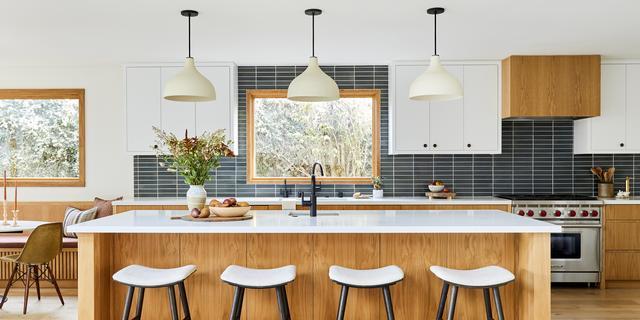Kitchen pendant lighting ideas – 14 ways to approach hanging lights during a kitchen redesign
Kitchen pendant lighting ideas are the heart and soul of your kitchen's lighting scheme, and it's undoubtedly where you'll spend the most time looking for a design to fit the style and layout of the space.
But with such a vast array of pendant lights out there to consider, where do you begin? 'Pendants are on the more decorative side of kitchen lighting ideas,' says James Veal, co-founder of Brooklyn-based design studio Stewart & Schafer, 'so your choice is really going to depend on the look you're going for.'
While defining your kitchen design style might help to narrow down your search for the perfect pendant, practical considerations may play into your decision-making too, from the positioning of your pendant light within the kitchen (they're not just for islands, after all), to the type of light you need it to provide for the room.
With that in mind, we're taking a look at different nuances in kitchen pendant lighting and how they can affect your redesign, with advice from top interior and kitchen designers.
Kitchen pendant lighting ideas
Pendant lights should be considered as part of a wider kitchen lighting scheme, alongside wall lights and downlighters. The right kitchen pendant lighting idea will form a perfect partnership with these other elements not only in looks, but in providing the right mix of ambient and task lighting for the room.
Another challenge for choosing pendant lighting also presents itself for open plan kitchen ideas, where multiple pendants may vie for attention over the island, countertop, and/or dining table.
Using the same pendant is an easy way around this dilemma, but not always for the best of the overall kitchen design. Combining different scales, numbers and finishes of pendant lighting requires a more delicate balancing act, but will result in a richer scheme.
'This could mean choosing something more dramatic in style to place over a dining table and a small set of pendants over the island,' suggests Allison Lynch, a senior design consultant at Roundhouse.
1. Pick a feature pendant for a kitchen island
The most natural place to include a pendant light is over a kitchen island, not only centering it as the heart of the home and anchoring it within the space, but providing a showcase for a statement piece that will crown your kitchen redesign perfectly.
There are many kinds of kitchen island lighting ideas to consider, but this space offers you an opportunity to go bold with your choice. Take this kitchen design by Blakes London, for example. In a space that has a lot of vibrant and exciting design details, this large fixed pendant light holds its own.
However, decoration doesn't need to come at the expense of practicality. 'When it comes to kitchen island lighting, decorative pendants are very popular as people want to make a statement and feature, but it’s important to be careful not to create shadows over the cooking and prep area,' says Piero de Marchis, director of Detail Lighting. This is something that can be hard to predict with decorative designs but can be safeguarded against by supplementing pendants with downlights or spotlights for extra task lighting.
2. Choose a linear style pendant
Sleek linear styles may not always have the same wow-factor as a large, feature pendant light, but in the right set-up, they'll compliment your room perfectly.
'Linear lighting is sleek and minimalist,' says Ahmad AbouZanat, a New York-based interior designer, 'but works best when the light has an interesting backdrop.' This might be more decorative wall lights, a dramatic splashback or a well-styled kitchen shelving idea.
Linear lighting is more effective when it comes to illuminating for tasks, casting a long, even light across your island or countertops, ensuring no dark spots. They are also well-suited for galley kitchen ideas, echoing the shape of the room and retaining sightlines through the space to the garden or outdoor space.
3. Supersize shades for a statement space
When choosing a singular kitchen pendant over an island, if you opt for something too small, it may feel lost in the space, while not offering enough light for your surfaces.
So how big should a kitchen pendant light be? It all depends on the size of your kitchen island – the longer your island and higher your ceiling, the bigger your pendant can be. Even if you opt for a supersized pendant, you'll want to make sure that it's smaller than the island by a comfortable margin, while not blocking the view of the space when standing behind the island.

4. Try glass shades in a small kitchen
Bulky pendant lighting can also reduce your kitchen's sightlines, creating a barrier across an island or dining table that makes these spaces less suitable for socializing, especially if you have tall friends, while also blocking out light and feeling top-heavy.
Wherever you're using pendant lighting in the kitchen, glass shades and globes can reduce this feeling of lighting-induced claustrophobia, as well as casting light in all directions for more effective ambient lighting throughout the space – particularly useful as a small kitchen lighting idea.
For those with more maximalist proclivities, glass doesn't have to be a plain option either. ‘Glass pendants tend to be more subtle,' says Roundhouse designer Allison Lynch, 'but, of course, they are available in a variety of shapes and colors that can be used to make a fun feature.'
5. Follow the rule of three with kitchen pendant lights
The rule of three is a design trick that's used for everything from color to styling accessories – and it can be applied to kitchen pendant lighting ideas too. The concept is based on the idea that groups of three create a sense of visual balance, but it can be more widely applied to odd numbers – meaning groups of five also benefit from the same pleasing effect.
'Pendants in groups of threes is an interior designer’s trick to break up strict lines,' explains Charlie Bowles, director of lighting brand Original BTC, but the same goes for kitchen wall lighting ideas where groups of three create a sense of symmetry.
The spacing you choose will depend on the size of your pendants and the island overall, but aim for between two and three times the size of the pendant as a gap between each light for a pleasing to the eye layout.
6. Drop a pendant light over a countertop
While pendant lights are more regularly used in the center of a kitchen, contemporary designers have taken to using these fixtures along the periphery of a room too.
Dropping a pendant light over a kitchen countertop offers alternative task lighting to both wall lights, downlighters and other kitchen ceiling lighting ideas, and without worries of knocking your head on a pendant, the pendant could be dropped lower, creating an interesting design detail.
7. Style a rise and fall pendant for an industrial edge to your space
Whether you use a rise and fall pendant design or run cabling across the room from a more distant light fixture, this use of excess flex and decorative fixings can create an edgy industrial vibe for your kitchen.
However, this type of kitchen pendant lighting idea isn't just for decoration – the rise and fall mechanism can actually be used to adjust the height on the pendant, making it a brilliant lighting trick to use as a kitchen countertop idea. It means you can lower it for task lighting as and when you need to, such as for reading a recipe after dark, and re-adjust when you're finished to tuck it out of the way.
Rise and fall designs tend to have simpler shades, such as this fluted glass design, with the detail focused on the ornate weight and pulley system.
8. Try exposed bulbs for a simple take on pendant lighting
While LED lighting and fixtures with diffusing shades are much-loved for their ability to cast a soft glow around a kitchen, pendant designs with exposed bulbs remain perennially popular, and work especially well in homes that embrace their period features.
However, your choice of light bulb is all-important when using exposed bulbs to ensure the light isn't so harsh that your kitchen feels uncomfortable. Warmer colored light can help here, which is one of the reasons squirrel cage-style Edison light bulbs are commonly used, but be wary that these super warm bulbs are less useful for task lighting, as cooler white lights offer better vision.
9. Design in pendant lights instead of downlighters in your kitchen
While downlighters are commonly used to create your kitchen's overall ambient lighting, deVOL Kitchens' creative director Helen Parker has replaced them with multiple pendants, spread across the entirety of the kitchen, in this clever design.
Becoming the signature of the space, white shades in different, but closely related, styles are used at different heights for an eclectic look that flatters and adds interest to this white kitchen idea.
10. Create a cluster of pendants for dramatic style
While well-spread, spaced-out pendant lighting is a common sight in a kitchen, cluster-style lighting can also be effective in the right design, such as over smaller expanses of countertop or mini-islands and peninsulas where a larger spread of light isn't so important.
You can approach clustered lights in two ways – the first, using a light fixture that has several pendant drops, combined on one ceiling rose as in this luxurious marble kitchen idea; the second, using individual pendant lights wired onto the same circuit and installed in a close cluster.
11. Use pendant lighting to emphasize vaulted ceilings
If you're lighting up a standard space, there's a general rule for getting the height of your pendant lighting to look right, but for those with kitchens in large vaulted rooms, there's scope to play around with pendant lighting to highlight this impressive feature.
'In terms of height above the island, I always suggest a minimum of 34 to 36” for pendant lighting,' says interior designer Ahmad AbouZanat, 'but you should consider positioning them higher if the space allows for it.'
In food writer Anna Barnet's kitchen, antique globe pendant lights have been raised higher to frame the large open shelving on the back wall, while drawing the eye up to the double-height ceiling.
12. Upgrade flexes for a luxe finish
Some pendant lighting designs, even at medium-to-high price points, rely on basic flexes for cabling – something that can be potentially customized for both a bespoke look and a better finish to your lighting choices.
Changing a flex color from white or black to a custom shade is one way to approach it, and can likely be undertaken by a good electrician. Another option is adding a pendant chain or similar to tie in with your finishes – an easy DIY job if you can find an appropriate style.
13. Hang a pendant light under glazing
For a single storey extension idea roof lights and lanterns can create limitations on where you can hang pendant lights. Some architects may avoid locating glazing over islands in order to keep the option for pendant lighting for this space, but centering a large roof lantern, in particular, can help ensure this area is flooded with natural light during daylight hours.
If you want the best of both worlds, there are options open to you, but the first port of call should be with the manufacturer of your roof lantern. Many modern roof lanterns have the option for integral conduits, through which cabling for lighting can be run, meaning it’s possible to hang a pendant light from the apex of your lantern.
For frameless roof lights, however, you may have to get a bit more creative.
14. Hang lighting from a raftered ceiling
House extensions with exposed rafters are a growing architectural trend, and they might just offer you a solution to hanging lighting when using large expanses of glazing in your project.
A design like this from London-based Amos Goldreich Architecture has positioned fixed pendant lighting fixed to the oak-clad structural steel rafters to create a more intimate nook in this kitchen-adjacent space.
How do I choose a pendant light for my kitchen?
To narrow down your choices for pendant lighting, look at it in the context of the rest of your kitchen design. 'Consider matching the style of your light fittings to your kitchen – prismatic glass and bone china work wonderfully in country-style kitchens, metallic pendants give an industrial flavor and brightly painted pendants bring an often-needed pop of color.' says Original BTC's Charlie Bowles.
In general, the positioning of pendant lighting isn't going to require specialist IP or NEMA ratings, but if you're looking to locate pendant lighting over a kitchen sink or very close to the range, choosing a steam-resistant rating might be in your be interest.







